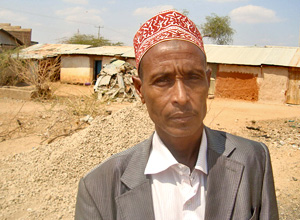From: Berhane Habtemariam (Berhane.Habtemariam@gmx.de)
Date: Fri Aug 26 2011 - 14:53:53 EDT
KENYA: Demo Hassan, "For 40 years, food aid has been routine"
GARBATULLA, 26 August 2011 (IRIN) - The humanitarian response to Kenya's
current food crisis may be unusual in its scale and media attention but
there is nothing new about food aid in northern Kenya, where lack of
development, insecurity, population growth and recurrent drought have long
combined to undermine self-sufficiency. Several million people there receive
food aid as a matter of course. Demo Hassan, 66, a livestock trader in
Garbatulla, gives voice to the dependency problem theory, the idea that such
largesse feeds a vicious cycle.
"Today, a lorry loaded with sacks of maize, government relief supplies, came
here. It is okay [in the current context] but I often get sad when I see
trucks loaded with free food.
"For over 40 years, the supply of relief food to my Borana community has
been routine whether it rains or not. It started after independence [1963]
to support families whose animals were shot dead by government security
forces or confiscated during the Shifta war [1963-1968] to secede this
region to be a part of Somalia.
"[Then it] was justified because it helped desperate families who had lost
their animals, their source of livelihood.
"Now, periodic droughts, massive losses of animals and frequent conflicts in
this region are being used to justify heavy spending [on] emergency relief
food.
"But [relief food] is not the only way to help a community, it has not
helped any recipient to be rich, it has deprived us of our dignity and
killed our diverse talents.
"The free food has encouraged laziness; people just wait for the food
rations.
"The youth, energetic men and women, who used to engage in livestock trade,
work as herders, do crop faming and small business like selling milk and
animals, have all abandoned their work [to] idle around and wait for free
food.
"Some traders have closed their shops, as they have nobody to buy food from
them and are now some of the latest [food aid] recipients.
"Free food has dignified the habit of begging.
"It is common to see able-bodied men visiting NGO and government offices to
beg for relief food yet they can feed themselves and their families, do
manual work, farm or form a group to borrow money to start a small business.
"Through my community's campaign, Stop Free Food, we can change perceptions
about the arid lands. We are lobbying for alternative programmes that can be
started after the current severe drought.
"We can start by planning, identifying the talents of the [food aid]
recipients. Why should they be given free food permanently?
"We have many livestock traders like me who can be assisted with funds to
purchase large herds of animals, hire trucks and sell them to far-away,
profitable markets in Nairobi [the capital] and other towns.
"Many families can resume crop farming. All they need is seeds and water
pipes to supply water by gravity from the permanent rivers in [the] Kinna,
Rapsu and Gafarsa areas.
"Farmers require trucks to ferry their produce to the market rather than
feed their animals with some of the produce like in the past.
"Our district is endowed with a lot of resources; honey production and
eco-tourism are all possible.
"[But] I am worried about our children dropping out of school to join their
parents in waiting for relief food. Aid agencies should offer full bursaries
to our children; a lot of talent has been wasted due to this disgusting
habit of waiting to be fed.
"We need tertiary institutions here as we have a huge youth potential.
"I am sure my grandchildren will not require relief food as my two children,
who are in college, will get good jobs."
na/aw/am/mw
<http://www.irinnews.org/PhotoDetail.aspx?ImageId=201108261157010625>
http://irinnews.org/images/2011/201108261157010625.jpg
Photo: <http://www.irinnews.org/photo/> Noor Ali/IRIN
Hassan Demo says free food has encouraged laziness

------------[ Sent via the dehai-wn mailing list by dehai.org]--------------